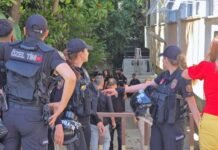Şahin Alpay, a jailed veteran journalist and columnist of now-closed Zaman daily, has compared the conditions of infamous Sağmalcılar Prison in the wake of September 12, 1980 military coup in Turkey and the conditions of notorious Silivri Prison today in Turkey in a letter from his prison ward and said ironically that “In 2017, it is obvious that those who live in Silivri Prison are better to those who were in Sağmalcılar Prison 30-35 years ago: We can take a shower whenever we want.”
Şahin Alpay, who has been in jail for 456 days, shared his letter via P24 website and took stock of the prisoners in Sağmalcılar Prison after the September 12, 1980 military coup by comparing them with the prisoners serving time in Silivri Prison today.
Alpay, saying that he read the authorized biography of journalist Ali Sirmen written by Ümit Aslanbay and compared the prison conditions of two periods, shares his opinion in his letter with the following sentence: “In the memoirs of Ali Sirmen, who belonged the same generation with me, I saw the prisons of the September 12 (1980) and the prisons of March 12 (1971). Both were worse than today’s civil courts and prisons’ he says (p. 127). This observation gives us a good idea of where we have come from to these days in 30-35 years. There is also an observation of not changing: ‘When I started university, we were worried for the country to extricate itself. We are still talking about the same thing.’ (p. 168). Exactly.”
“In 2017, it is obvious that those who live in Silivri are better to those who were in Sağmalcılar 30-35 years ago: we can take a shower whenever we want,” Şahin Alpay adds ironically.
The full text of Şahin Alpay’s letter is as follows:
“From Sağmalcılar to Silivri
It is obvious that those who live in Silivri in 2017 had superiority over those who were in Sağmalcılar 30-35 years ago: we can take a shower when we want.
I was curious when seeing the announcement of Ümit Aslanbay’s interview with Ali Sirmen last May and the interview published with the title ‘For an Old Republic’; I asked my children to bring a copy of this book right away.
Before I could read the book, Sirmen wrote the following line: “I feel the same sadness and shame for Nazlı Ilıcak, Şahin Alpay, Ahmet and Mehmet Altan, whom I do not share the same views.
I believe that they have been unfairly imprisoned, and until they are free no one will be free in the true sense. “(Cumhuriyet, 11 June 2017)
You cannot imagine how much these lines made me touched. I immediately called my children to call Sirmen and convey my heartfelt gratitude. I do not know, my message reached him or not.
On September 18-19, 14 months later, we had no right to write a letter until the first hearing.
The first letter I wrote from Silivri was released on October 3, 2017 in P24. This is my second letter on the memoir I read with great interest from Sirmen.
My evaluation of the republican division and other issues that happened in 1992 is quite different from Sirmen. If I can get the opportunity to publish my memories, these differences can be seen.
Ümit Aslanbay has done something very good, and added to the book Sirmen’s prison memories published in the Cumhuriyet daily in August 2008 under the headline “Stories of Sağmalcılar Prison.” It was exciting to compare my current prison observations with the prison observations of Sirmen 30-35 years ago.
Ali Bey, who belongs to the same generation with me, said in his memories, “I have seen the prisons and the courts of September 12 (1980 military coup), March 12 (1971 military memorandum). Both were worse than today’s civil courts and prisons,” he says (page 127). This observation gives us a good idea of where we have come from to these days in 30-35 years. There is also an observation of not changing: “When I started university, we were worried for the country to extricate itself. We are still talking about the same thing” (page 168). Exactly.
The thing, which is very striking in the context of the unchanging, is that Sirmen’s Sağmalcılar observations and my Silivri observations are almost same:
“There is no shame or boast in being imprisoned in a country like Turkey…” (p. 234).
“It is necessary not to weep and cry in the face of this event, which is done to intimidate us, we should take lightly” (p. 235).
“When a person goes out of custody and goes to the ward, it feels like an eviction…” (p. 238).
“It is said that prison is a school of life, it is right…” (p. 253).
“You realize you are being cleansed in the dishwashing in fact that I used to see as a very dirty work…” (p. 254).
“The place that is at the same distance from every point of the world is a prison” (p. 257).
“Would we ever be here if we used our minds?” (p. 273)
“We had TV. We had been seeing the trees, the flowers, the streets, the avenues, the women, the cats, the seas, the mountains on the white screen” (p. 280).
“You get lost in thought alone while pacing back and forth, sometimes you go down to the seaside…” (p. 291).
Search: “The doors of the ward are suddenly opened quickly… The guards, the soldiers order with a hard tone…” (p. 304).
At that time (prisoner) Hüseyin Baş, who was in his 50s, told Sirmen: “I am ready to serve time two folds after 10-15 years…” (p. 262). I, who is in 70s, do not know what it means.
A prisoner told Sirmen, “Don’t say that, Ali brother, life is beautiful even in prison.” (p. 253). I am not agree with that at all.
Ali Sirmen stayed in an average of 90-person wards; I am staying in a 3-person ward. Which is better? I am not sure.
It is obvious that those who lived in Silivri in 2016-2017 had a superiority over the ones who lived in Sağmalcılar 30-35 years ago: We can take a shower whenever we want.
With this letter, I send my regards and respects to Ali Sirmen, and friends and readers. In this way I gave additional information about the lives of prisoners.
Sincerely,
Şahin Alpay (Prisoner)
Silivri Closed Penal Execution Institution
Section 9, A4 Block, Room 1
23 October 2017”
Turkey is the biggest jailer of journalists in the world. The most recent figures documented by the Stockholm Centre for Freedom (SCF) has showed that 255 journalists and media workers are now in jails as of October 26, 2017, most in pre-trial detention languishing in notorious Turkish prisons without even a conviction. Of those in Turkish prisons, 231 are arrested pending trial, only 24 journalists remain convicted and serving time in Turkish prisons. An outstanding detention warrants remain for 135 journalists who live in exile or remain at large in Turkey.
Detaining tens of thousands of people over alleged links to the Gülen movement, the government also closed down more than 180 media outlets after the controversial coup attempt.















